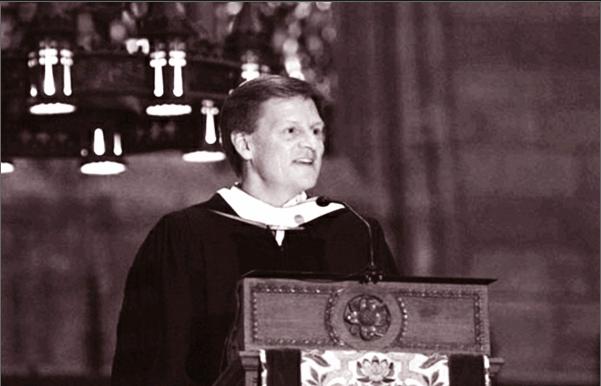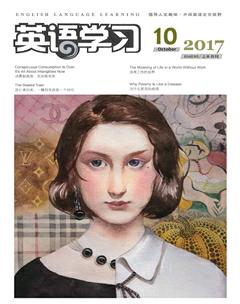别吃那块幸运饼干
By+Michael+Lewis


Financial journalist and award winning author Michael Lewis gave an inspiring Commencement Speech at Princeton in 2012.1
Thirty years ago, I sat where you sat. I must have listened to some older person share his life experiences. But I dont remember a word of it. I couldnt even tell you who spoke. What I do remember, vividly, is graduation. Im told youre meant to be excited, maybe even a little relieved, and maybe all of you are. I was not. I was totally outraged. Here Id gone and given them four of the best years of my life and this is how they rewarded me by throwing me out.
At that moment I was sure really of only one thing: I was of no possible economic value to the outside world. Id majored in art history, for a start. Even then this was regarded as an act of insanity2. I was almost certainly less prepared for the marketplace3 than most of you. Yet somehow Ive wound up4 rich and famous. Well, sort of. Im going to explain, briefly, how that happened. I want you to understand just how mysterious careers can be, before you go out and have one yourself.
So I graduated from Princeton without ever having published a word of anything, anywhere. But at Princeton, studying art history, I felt really the first twinge5 of literary ambition. It happened while I was working on my senior thesis6. My adviser was a truly gifted man, an archaeologist7 named William Childs. The thesis tried to explain how the Italian sculptor Donatello8 used Greek and Roman sculpture. God knows what Professor Childs thought of it, but he helped me to become engrossed9. Actually more than engrossed: obsessed. When I handed it in, I knew what I wanted to do for the rest of my life: to write senior theses. Or, to put it differently: to write books.
Then I went to my thesis defense. I listened and waited for Professor Childs to tell how well written my thesis was. He didnt. So after about 45 minutes I finally said, “So. What did you think of the writing?”
“Put it this way,” he said, “Never try to make a living at it.”
And I didnt—not really. I did what everyone does who has no idea what to do with themselves: I went to graduate school. I wrote at nights, without much effect, mainly because I hadnt the first clue what I should write about. One night I was invited to a dinner, where I sat next to the wife of a big shot at a giant Wall Street investment bank, called Salomon Brothers.10 She more or less forced her husband to give me a job. I knew next to nothing about Salomon Brothers. But Salomon Brothers happened to be where Wall Street was being reinvented11.endprint

When I got there I was assigned, almost arbitrarily, to the very best job in which to observe the growing madness: they turned me into the inhouse derivatives expert.12 A year and a half later, Salomon Brothers was handing me a check for hundreds of thousands of dollars to give advice about derivatives to professional investors.
Now I had something to write about: Salomon Brothers. Wall Street had become so unhinged that it was paying recent Princeton graduates who knew nothing about money small fortunes to pretend to be experts about money.13 Id stumbled into14 my next senior thesis.
I told my father I was gonna quit this job that promised me millions of dollars to write a book for an advance of 40 grand15. There was this long pause on the other end of the line. “Stay at Salomon Brothers for 10 years, make your fortune, and then write your books,” he said. I didnt need to think about it. I knew what intellectual passion felt like—because Id felt it here, at Princeton—and I wanted to feel it again. I was 26 years old. Had I waited until I was 36, I would never have done it. I would have forgotten the feeling.
The book I wrote was called Liars Poker. It sold a million copies. I was 28 years old. I had a career, a little fame, a small fortune and a new life narrative. All of a sudden people were telling me I was a born writer. This was absurd. Even I could see there was another, more true narrative, with luck as its theme. What were the odds16 of being seated at that dinner next to that Salomon Brothers lady? Of landing inside the best Wall Street firm to write the story of the age? Of having parents who didnt disinherit17 me but instead sighed and said “do it if you must”? Of having had that sense of “must” kindled18 inside me by a professor of art history at Princeton? Of having been let into Princeton in the first place?
This isnt just false humility. Its false humility with a point.19 My case illustrates how success is always rationalized.20 People really dont like to hear success explained away as luck, especially successful people. As they age, and succeed, people feel their success was somehow inevitable. They dont want to acknowledge the role played by accident in their lives.
I wrote a book about this, called Moneyball. It was ostensibly21 about baseball but was in fact about something else. The story has a broader and less practical message: dont be deceived by lifes outcomes. Lifes outcomes, while not entirely random, have a huge amount of luck baked into them.22 Above all, recognize that if you have had success, you have also had luck—and with luck comes obligation. You owe a debt, and not just to your Gods. You owe a debt to the unlucky.endprint
I make this point because—along with this speech—it is something that will be easy for you to forget.
I now live in Berkeley, California. A few years ago, just a few blocks from my home, a pair of researchers in the Cal psychology department staged an experiment.23 They broke the students into teams. Three men, or three women, per team. Then they put these teams of three into a room, and arbitrarily assigned one of three to act as leader. Then they gave them some complicated moral problem to solve. Exactly 30 minutes the researchers interrupted each group. They entered the room bearing a plate of cookies. Four cookies. Every team member obviously got one cookie, but that left a fourth cookie, just sitting there. It should have been awkward. But it wasnt. With incredible consistency the person arbitrarily appointed leader of the group grabbed the fourth cookie, and ate it.
This leader had performed no special task. He had no special virtue. Hed been chosen at random, 30 minutes earlier. His status was nothing but luck. But it still left him with the sense that the cookie should be his.
This experiment helps to explain Wall Street bonuses, CEO pay, and, Im sure, lots of other human behavior. This is how people behave, when they are blind in their own luck. As new graduates of Princeton, you must sense its arbitrary aspect: you are the lucky few. Lucky in your parents, lucky in your country, lucky that a place like Princeton exists that can take in lucky people, introduce them to other lucky people, and increase their chances of becoming even luckier. Lucky that you live in the richest society the world has ever seen, in a time when no one actually expects you to sacrifice your interests to anything.
All of you have been faced with the extra cookie. All of you will be faced with many more of them. In time you will find it easy to assume that you deserve the extra cookie. For all I know, you may deserve the extra cookie. But youll be happier, and the world will be better off, if you at least pretend that you dont.
So never forget: In the nations service. In the service of all nations. Thank you. And good luck.
1. Michael Lewis: 邁克尔·刘易斯,美国当代报告文学作家、财经记者,毕业于普林斯顿大学和伦敦经济学院,曾任债券交易员,著有畅销书《说谎者的扑克牌》(Liars Poker)、《将世界甩在身后》(The New New Thing)和《魔球》(又译《点球成金》,Moneyball)等;commencement: 毕业典礼;Princeton: 普林斯顿大学,成立于1746年,是美国一所私立研究型大学,现为八所常春藤盟校之一。
2. insanity: 精神错乱。
3. marketplace: 商业活动,交易。
4. wind up:(使)结束,以……告终。
5. twinge: 剧痛,刺痛。
6. senior thesis: 毕业论文。下文中的thesis defense是论文答辩,theses是thesis的复数形式。
7. archaeologist: //考古学家。
8. Donatello: 多那太罗(1386—1466),是15世纪意大利佛罗伦斯著名的雕刻家,文艺复兴初期写实主义与复兴雕刻的奠基者。
9. engrossed: 全神贯注的,专心致志的。
10. big shot: 大亨,权贵之人;Salomon Brothers: 所罗门兄弟,华尔街著名的投资银行,于1910年成立。
11. reinvent: 彻底改造。
12. arbitrarily: 随意地;derivative:/ 衍生产品(一种金融投资),增值投资。
13. 华尔街已疯狂到付着可观的薪水,让刚从普林斯顿毕业、对钱财毫无概念的学生来假扮金融专家。unhinged: 疯狂的;small fortune:〈非正式〉大量的钱。
14. stumble into: 偶然卷入(或介入)。
15. an advance of 40 grand: 四万美元预付款,grand是一千美元的意思。
16. odds: 机会,可能性。
17. disinherit: 剥夺……的继承权。
18. kindle: 引起兴趣,激发感情。
19. 这是有意义的假谦卑。
20. 我的例子说明人们一直在给成功找合理的解释。rationalize: 为……找出合理的解释。
21. ostensibly: 表面上。
22. 生活的结果,虽然不都是随机的,却也蕴藏着很大的运气成分。bake into: 合并,兼并。
23. Cal: 这里指加州大学伯克利分校;stage: v. 组织,举行。endprint

